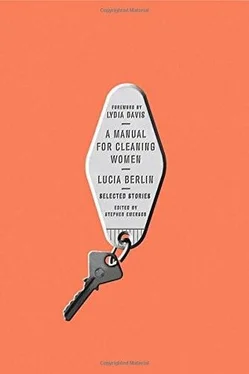On weekends sometimes he’d take me to the dog track in Juárez, or to gambling games around town. I loved the races and was good at picking winners. The only time I liked going to card games was when he played with railroad men, in a caboose at the train yards. I climbed the ladder to the roof and watched all the trains coming in and going out, switching, coupling. It got to be that most of the card games were in the back of Chinese laundries. I’d sit in the front reading for hours while somewhere in back he played poker. The heat and the smell of cleaning solvent mixed with singed wool and sweat was nauseating. A few times he left out the back way and forgot me, so that only when the laundryman came to close up did he find me asleep in the chair. I’d have to go home, far, in the dark, and most of the time nobody would be there. Mamie took Sally to choir practice and to the Eastern Star and to make bandages for servicemen.
About once a month we’d go to a barbershop. A different one each time. He’d ask for a shave and a haircut. I’d sit on a chair reading Argosy while the barber cut his hair, just waiting for the shave part. Uncle John would be tilted way back in the chair and just as the barber was finishing the shave he’d ask, “Say, do you happen to have any eyedrops?” which they always did. The barber would stand over him and put drops in his eyes. The green glass eye would start spinning around and the barber would scream bloody murder. Then everybody’d laugh.
If only I had understood him half as much as he always understood me, I could have found out how he hurt, why he worked so hard to get laughs. He did make everybody laugh. We ate in cafés all over Juárez and El Paso that were like people’s houses. Just a lot of tables in one room of a regular house, with good food. Everybody knew him and the waitresses always laughed when he asked if it was warmed-over coffee.
“Oh, no!”
“Well, how’d you get it so hot?”
I could usually tell just how drunk he was, and if it was a lot I’d make some excuse and walk or ride the trolley home. One day though, I had been sleeping in the cab of the truck, woke after he got in and started off. We were on Rim Road going faster faster. He had a bottle between his thighs, was driving with his elbows as he counted the money he held in a fan over the steering wheel.
“Slow down!”
“I’m in the money, honey!”
“Slow down! Hold on to the wheel!”
The truck thumped, shuddered high up and then thumped down. Money flew all over the cab. I looked out the back window. A little boy was standing in the street, his arm bleeding. A collie was lying next to him, really bloody, trying to get up.
“Stop. Stop the truck. We have to go back. Uncle John!”
“I can’t!”
“Slow down. You have to turn around!” I was sobbing hysterically.
At home he reached across and opened my door. “You go on in.”
I don’t know if I stopped speaking to him. He never came home. Not that night, not for days, weeks, months. I prayed for him.
* * *
The war ended and my father came home. We moved to South America.
Uncle John ended up on skid row in Los Angeles, a really hopeless wino. Then he met Dora, who played trumpet in the Salvation Army band. She had him go into the shelter and have some soup and she talked to him. She said later that he made her laugh. They fell in love and were married and he never drank again. When I was older I went to visit them in Los Angeles. She was working as a riveter at Lockheed and he had an antique repair shop in his garage. They were maybe the sweetest two people I ever knew, sweet together, I mean. We went to Forest Lawn and the La Brea tar pits and the Grotto restaurant. Mostly I helped Uncle John in the shop, sanding furniture, polishing with the turpentine and linseed oil rag. We talked about life, told jokes. Neither of us ever mentioned El Paso. Of course by this time I had realized all the reasons why he couldn’t stop the truck, because by this time I was an alcoholic.
I want to go home. When mijito Jesus falls asleep I think about home, my mamacita and my brothers and sisters. I try to remember all the trees and all the people in the village. I try to remember me because I was different then, before tantas cosas que han pasado . I had no idea. I didn’t know television or drogas or fear. I have been afraid since the minute I left the trip and the van and the men and running and even when Manolo met me I got more afraid because he wasn’t the same. I knew he loved me and when he held me it was like by the river, but he was changed, with fear in his gentle eyes. All of the United States was scary coming to Oakland. Cars in front of us, behind us, cars going the other way cars cars cars for sale and stores and stores and more cars. Even in our little room in Oakland where I’d wait for him the room was full of noise, not just the television but cars and buses and sirens and helicopters, men fighting and shooting and people yelling. The mayates frighten me and they stand in groups all down the street so I was afraid to go outside. Manolo was so strange I was afraid he didn’t want to marry me but he said, “Don’t be crazy, I love you mi vida .” I was happy but then he said, “Anyway you need to be legal so you can get welfare and food stamps.” We got married right away and that same day he took me to the welfare. I was sad. I wanted to maybe go to a park or have some wine, a little luna de miel party.
We lived in the Flamingo Motel on MacArthur. I was lonely. He was gone most of the time. He got mad at me for being so scared but he forgot how different it was here. We didn’t have inside bathrooms or lights at home. Even the television frightened me; it seemed so real. I wished we had a little house or room that I could make pretty and where I could cook for him. He would come with Kentucky Fry or Taco Bell or hamburgers. We ate breakfast every day in a little café and that was nice like in Mexico.
One day there was a banging on the door. I didn’t want to open it. The man said he was Ramón, Manolo’s uncle. He said Manolo was in jail. He was going to take me to talk to him. He made me pack up all my things and get in the car. I kept asking him, “Why? What happened? What did he do?”
“ No me jodes! C á llate ,” he told me. “ Mira , I don’t know. He’ll tell you. All I know is you’ll be staying with us until he goes to court.”
We went into a big building and then in an elevator to the top floor. I had never been in an elevator. He talked to some police and then one took me through a door to a chair in front of a window. He pointed to a phone. Manolo came and sat down on the other side. He was thin and unshaven and his eyes were full of fear. He was shaking and pale. All he was wearing was some orange nightclothes. We sat there, looking at each other. He picked up a phone and pointed to me to pick up mine. It was my first telephone call. It didn’t sound like him but I could see him talking. I was so afraid. I can’t remember everything, except that he said he loved me and he was sorry. He said he would let Ramón know when he’d go to court. He hoped he’d come home to me then. But if he didn’t, to wait for him, my husband. Ramón and Lupe were buena gente , they would take care of me until he got out. They needed to take me to the welfare to change my address. “Don’t forget. I’m sorry,” he said in English. I had to think how you said it in Spanish. Lo siento . I feel it.
If only I had known. I should have told him I’d love him and wait for him always, that I loved him with all of my heart. I should have told him about our baby. But I was so worried and too frightened to talk into the phone so I just looked at him until the two policemen took him away.
Читать дальше












